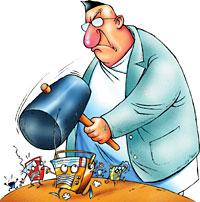 The Supreme Court has stayed the Ministry of Information's decision to close down Radio Sagarmatha till 7 December. Once again, timely intervention by the court has bought time for a pioneering community radio that symbolised people power not just in Nepal but also the region.
The Supreme Court has stayed the Ministry of Information's decision to close down Radio Sagarmatha till 7 December. Once again, timely intervention by the court has bought time for a pioneering community radio that symbolised people power not just in Nepal but also the region. But what the episode also exposed was the deep insecurity of a regime that is afraid of its own shadow following the party-rebel pact. It was another brazen nocturnal raid on a radio station, a methodology that has become the trademark for the way these fellows go about their business.
The flunkies assigned to carry out the order of the unnamed 'higher up authority' violated just about every principle of civilised behaviour. It was a violation of the citizens' right to Freedom of Expression and Right to Information, it went against Article 19 of the International Covenant on Civil and Political Rights, the Universal Declaration of Human Rights 1948 and it violated the 1990 constitution.
But much more than all that, it showed that the council chaired by the king does not respect even the laws that it swears by. It proved that doubts about the royal regime's legitimacy are well founded and gave more reason for critics to doubt its honesty and sincerity.
The Attorney General says a Hindu king's authority is almost limitless. It's a little difficult to argue with logic like that. In all modern societies, individuals have inalienable rights-they can't be given or taken away, bought sold or bartered. They can't be abrogated. Rights thus have intrinsic as well as instrumental value since rights help establish peace.
A government, even if it is for its own survival, must protect the basic rights of its citizens. They never learn from history, do they? Governments violate these tenets at their own peril however much they cloak it all as punishment for airing the interview of a terrorist. (For the record: Radio Sagarmatha never broadcast the Prachanda interview, the state just presumed it would.)
As the highest court of interpretation and custodian of the constitution, it is the responsibility of the Supreme Court to stand by the fundamental rights of the people, since the post-February First regime has decided not to. By restraining the government from imposing its will, the court has given us reason to hope but it needs to do a lot more in the days to come. After all, it's not just journalists who need Radio Sagarmatha and the dozens of other citizens' media across the country but the people who depend on them to be informed. And that, obviously, is what scares this regime the most.


